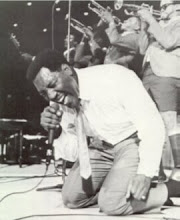 MIAMI (Reuters) - Rock 'n' roll pioneer Bo Diddley, who banged out hit songs powered by the relentless "Bo Diddley beat" that influenced rockers from Buddy Holly to U2, died on Monday at the age of 79.
MIAMI (Reuters) - Rock 'n' roll pioneer Bo Diddley, who banged out hit songs powered by the relentless "Bo Diddley beat" that influenced rockers from Buddy Holly to U2, died on Monday at the age of 79.Diddley died of heart failure at his home in Archer, Florida, his management agency, Talent Consultants International, said in a statement.
"One of the founding fathers of rock 'n' roll has left the building he helped construct," the statement said.
Diddley suffered a stroke during a concert in Iowa in May 2007 and was hospitalized in Omaha, Nebraska. In August 2007 he had a heart attack in Florida.
Garry Mitchell, a grandson of Diddley and one of more than 35 family members at the musician's home when he died at about 1:45 a.m. EDT (0545 GMT), said his death was not unexpected.
"There was a gospel song that was sang and he said 'wow' with a thumbs up," Mitchell told Reuters, when asked to describe the scene at Diddley's deathbed.
"The song was 'Walk Around Heaven' and in his last words he stated that he was going to heaven."
In a career spanning more than five decades, Diddley composed a substantial body of rock classics, including "Who Do You Love," "Bo Diddley," "Bo Diddley's a Gunslinger," "Before You Accuse Me," "Mona," "I'm a Man" and "Pretty Thing."
He cranked them out on a signature rectangular guitar, setting many of them to rumba-like rhythm of his "Bo Diddley beat" that gave rock 'n' roll a powerful rhythmic foundation.
Along with such contemporaries as Chuck Berry and Little Richard, he was among a pioneering group of black recording artists who crossed the American racial divide with music that appealed to white audiences and was emulated by white performers.
Although Diddley recorded relatively few chart-topping hits, his seminal role in the formative years of rock music was recognized by his induction into the Rock and Roll Hall of Fame in 1987 and with a Grammy lifetime achievement award in 1998.
Born Ellas Bates in 1928 in McComb, Mississippi, he took the last name McDaniel from his adoptive mother, and played classical violin as a boy.
'FIRST DUDE OUT THERE'
He was given the nickname Bo Diddley as a teenager after moving to Chicago, where he started playing music on street corners in the 1940s.
Inspired by blues musician John Lee Hooker's classic "Boogie Chillen," Diddley used his violin skills to craft a guitar sound that laid the basis for the funk music of the 1960s.
He found fame in the mid-1950s with his signature song "Bo Diddley." Even among the first wave of rock music, the song stood out with its tremolo guitar, maracas and trademark beat.
Diddley's unique guitar playing and rhythm influenced generations of rockers from Elvis Presley to Bon Jovi. Keith Richards and Ron Wood of the Rolling Stones and Richie Sambora of Bon Jovi made guest appearances on his records and Diddley played with the likes of The Clash and The Grateful Dead.
Arguably the greatest mainstream success of a song with the Bo Diddley beat was Buddy Holly's "Not Fade Away," recorded in the 1950s and which saw renewed success when it was covered by the Rolling Stones in the 1960s.
In an interview with The Sydney Morning Herald in March 2007, Diddley insisted he was the real father of rock, saying: "Little Richard came two or three years later, along with Elvis Presley. In other words, I was the first dude out there."
Diddley frequently complained about not being paid royalties during his peak years, telling The New York Times, "Have I been ripped off? ... You bet I've been ripped off."
In 1955 Diddley appeared on "The Ed Sullivan Show" and was promptly banned from further appearances because he defied Sullivan's instructions to sing a cover song and instead performed his own hit "Bo Diddley."
Diddley had harsh words for the direction black music had taken in recent years, telling Reuters that "gangsta" rap made his blood boil.
"I hate it. I call it rap-crap," Diddley said in a 1996 interview. "I can't seem to get my records played but they'll play all this garbage."
Diddley liked to help out in his local community in Florida. A father of five, he said he was deeply concerned about the direction of children in American society.
He worked with his local police department to warn teenagers about the dangers of drugs and gang violence.
Diddley was still touring and making records in recent years, not least because he said he needed the money.
His agency said public and private services are planned for this weekend.


No comments:
Post a Comment